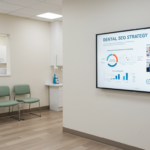Website Design Services: Agency vs Consultant – What’s Better?
In today’s digital world, having a well-designed website is crucial for any business or personal project. But when it comes to creating a professional website, many find themselves stuck with one major question: Should I hire an agency or a consultant? While both offer valuable expertise, there are key differences that might make one option more suitable for you. Let’s dive into the pros and cons of each and explore which one might be a better fit for your needs.
Understanding Website Design Agencies
What is a Website Design Agency?
A website design agency is a company that employs a team of professionals who specialise in various aspects of web design and development. These agencies often offer a full range of services including graphic design, UX/UI, content creation, SEO, and backend development. Their goal is to provide a comprehensive solution, often handling everything from initial design concepts to post-launch support.
Advantages of Using a Website Design Agency
- Comprehensive Solutions: Agencies provide an all-in-one package. From design to SEO, you’ll likely find all the skills needed under one roof.
- Larger Teams and Diverse Expertise: Agencies typically employ specialists in every field, meaning that you can benefit from a wide range of knowledge and skills.
- Ongoing Support and Scalability: Most agencies offer continuous support even after your website goes live, and can scale their services as your business grows.
Disadvantages of Using a Website Design Agency
- Higher Costs: The breadth of services offered by an agency comes with a hefty price tag. Agencies have higher overhead costs, which they pass on to their clients.
- Less Personalised Approach: Agencies often work with many clients at the same time, meaning that they may not be able to give you the undivided attention you need.
- Potential Delays: Larger teams often mean more bureaucracy. You might find yourself waiting longer for decisions or revisions as your project moves through several layers of approval.
Understanding Website Design Consultants
What is a Website Design Consultant?
A website design consultant, on the other hand, is usually a highly skilled individual (or a very small team) who specialises in one-on-one collaboration. Their focus is to deliver a customised design and development service tailored specifically to your needs. They work closely with you, often providing a more personal experience.
Advantages of Using a Website Design Consultant
- Personalised Service and Flexibility: Consultants are often more flexible and offer personalised solutions tailored to your business. You are not just another number in their client roster.
- Direct Communication and Quick Decisions: With fewer team members involved, communication is more direct and decisions are made faster. You can speak directly to the person responsible for your project.
- Cost-Effective: Consultants typically have lower overhead costs, making them a more budget-friendly option for small businesses or startups.
Disadvantages of Using a Website Design Consultant
- Limited Resources: A consultant may not have the extensive resources or the breadth of expertise that a large agency can offer. They may need to outsource certain aspects, which can add time and complexity.
- Potential for Slower Turnaround: While the communication might be more direct, consultants can be slower to deliver results if they are juggling multiple roles or projects at once.
Key Differences Between Agencies and Consultants
Team Size and Structure
Agencies generally have large teams that handle different aspects of website design, from coding to creative direction. Consultants, however, tend to work solo or with small teams, meaning they offer a more personal touch but may have limited bandwidth.
Cost Comparison
Agencies typically charge higher fees due to their larger teams and range of services. Consultants, by contrast, operate leaner, which often translates to lower costs for clients.
Level of Personalisation
When it comes to customisation, consultants often come out on top. While agencies might follow a structured process, a consultant can adapt their approach to suit your specific needs.
Expertise and Skill Sets
Agencies have a diverse range of experts under one roof, making them ideal for complex projects requiring multiple skills. Consultants, however, are often more specialised in a particular niche, giving them deep expertise in certain areas.
When to Choose an Agency?
Large Projects with Complex Requirements
If your project requires a wide range of services, such as graphic design, SEO, content creation, and development, an agency may be the best fit. Their larger teams can handle the different aspects of a complex project with ease.
Need for Comprehensive and Ongoing Support
Agencies are ideal for businesses looking for ongoing support, updates, and scalability. If you anticipate the need for continuous development or future expansion, an agency can offer the infrastructure to support your growth.
When to Choose a Consultant?
Small to Medium Projects
For smaller businesses or personal projects that don’t require a massive team, consultants offer a more personalised and cost-effective solution. If you need something unique and tailored to your vision, a consultant is likely to deliver better results.
Need for Personalised and Flexible Service
Consultants excel in offering customised solutions that align perfectly with your brand’s goals. If you prefer hands-on involvement and flexibility, working with a consultant can give you more control over the final product.
Budget-Conscious Solutions
For those on a tighter budget, consultants are typically the more affordable option. You’ll get the attention your project deserves without the steep costs associated with larger agencies.
Consultant vs Agency: Which is More Efficient?
Efficiency in Communication
Consultants often have an edge when it comes to communication. With fewer layers of management, you can expect faster responses and a smoother decision-making process.
Efficiency in Project Management
While agencies have formal processes in place, this can sometimes slow things down. A consultant’s approach, on the other hand, is often more agile, allowing for quicker adjustments as needed.
Tailored vs Process-Driven Approaches
If you’re looking for a tailored, personal approach, a consultant is more likely to provide this. However, if you need a systematic, reliable process with no surprises, an agency may be a safer bet.
Case Studies: Success Stories with Consultants
Small Business Growth through a Consultant’s Personalised Strategy
Take, for example, a small bakery that partnered with a website consultant. By understanding the bakery’s unique brand, the consultant designed a website that showcased its products in a charming, approachable way, helping the business grow by engaging more local customers.
Flexible Design Solutions Tailored to Specific Needs
A fitness instructor looking for a sleek, minimalist design found that working with a consultant allowed for more direct involvement in the design process. The result? A website that truly reflected her personal brand and engaged her target audience effectively.
Conclusion
In the battle between website design agencies and consultants, it all comes down to your specific needs. If you’re a small to medium-sized business looking for personalised service, flexibility, and cost-effective solutions, a consultant may be the better choice. While agencies offer the advantage of larger teams and broader expertise, consultants provide a more tailored approach that can deliver exactly what your business needs—without breaking the bank.
FAQs
Yes, many consultants offer ongoing maintenance services. They may also work with you on an ad-hoc basis, depending on your needs.
While consultants are typically better suited for smaller projects, some can handle larger-scale jobs depending on their expertise and available resources.
Consultants generally offer lower prices as they have fewer overhead costs, whereas agencies charge more due to their larger teams and range of services.
Yes, consultants use many of the same professional tools that agencies do, including design software, project management tools, and development platforms.
Consider the size of your project, your budget, and the level of personalisation you require. For more personal attention and flexibility, a consultant is often a better fit.









